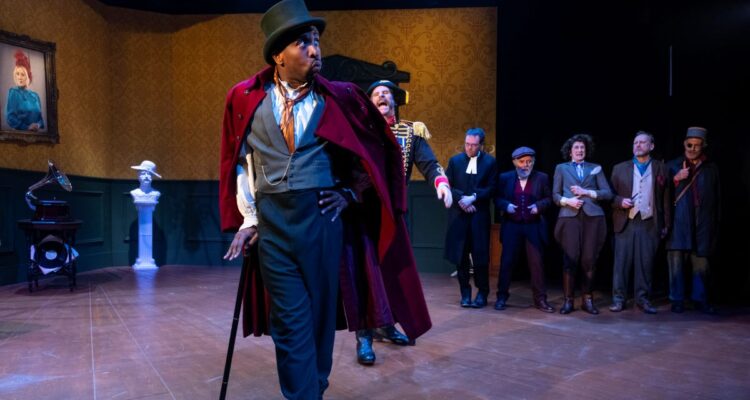Gogol’s play ‘The Government Inspector’ was a striking success right from its premiere in Tsarist Russia in 1836.It has since become the archetypal satire of provincial pretensions and hypocrisy, ruthlessly exposing in a way that is universally recognisable the potential gullibility and fallibility that resides in all of us in the face of a plausible trickster.
The idea originally came from Gogol’s older friend and colleague, Pushkin, who had himself been mistaken for a government official while on a provincial tour. From this personal experience emerges a much more elaborate scenario. The threatened arrival of an undercover inspection to stamp out corruption in a small town induces the leading citizens to jump to assumptions as to the identity of the inspector. Desperate to conceal their own transgressions, they conclude that a young man giving himself airs and graces at the local inn without paying for them, must be the mystery man.
In fact, he and his roguish servant are unemployed and on their uppers. They can’t believe their luck when the venal governor and his overweeningly pretentious wife settle their account and invite them to stay in their home. Each member of the local council bribes them in turn to secure a good report and the womenfolk compete to gain their attention and affections. Dazzled by his charm and apparent sophistication, everyone ‘dressed in a little brief authority’ surrenders their wits and fortunes. Only too late do they discover the extent of their collective humiliation.
Patrick Myles has relocated the action to Yorkshire while keeping costumes and sets broadly in period. Nothing wrong in that at all, but along the way a degree of the sharpness of the verbal satire has fallen away to be replaced by a broader, visually-focused slapstick style that blunts the edge and pace of the original. There is a still a lot to admire on the technical side, but where the action should fizz close to the dangerous edge of discovery and reveal, in many places the humour seems quite obvious, laboured, and anticipated. Stock characters and familiar jokes are no substitute for sharp focus and attack.
There is a truly excellent performance from Kiell Smith-Bynoe in the leading role. He is a performer we shall see a lot in the future. Alternately suave, debonair and louche, he insinuates himself differently with each of the characters, with compelling physicality and fine comic timing. He is well matched by the experienced husband-and-wife acting team of Dan Skinner and Martha Howe-Douglas as the governor and his socially climbing lady . It is easy to push such roles over the boundary between satire and caricature, but they mostly stayed on the right side of the line.
In a short review it is not possible to acknowledge all the members of a large cast, but there were some stand-out moments from several able character actors. Chaya Gupta ably vied with her mother for the attention of the inspector, moving plausibly from clueless ingenue to infatuated would-be bride. Anna Savva was suitably brazen as a corrupt local judge, and David Hartley was convincingly ingratiating as the local clergyman with a lot to hide. As usual, in this sort of drama, the twinkly realism comes from the servants rather than the masters, and both Daniel Millar and Alison Ward, excelled in dry put-downs at the expense of the deluded citizenry.
Melanie Jane Brookes delivered a flexible and practical set and costumes with a blend of period panache and suitably garish moments, especially for the raucous party scene. Overall, the evening passed by as a genial romp in panto style – the play can certainly take this approach, and the audience loved it; but there is a lot more in the situations and the text that could have been explored.
Finally, a special shout-out for the Marylebone Theatre, which is a delightful and currently underused space, with excellent sightlines and facilities, and deserving many more quality shows to come its way. The edge of Regent’s Park is not traditional theatre-land, but with excellent transport connections and a pleasant cafe in-house, this is a very satisfying theatrical experience all round.
Nikolai Gogol
Adapted & Directed by Patrick Myles
Cast includes: Martha Howe-Douglas, Chaya Gupta, David Hartley, Daniel Millar. Dan Skinner, Anna Savva, Kiell Smith-Bynoe
Until June 15 2024
2 hrs 10 mins including interval

